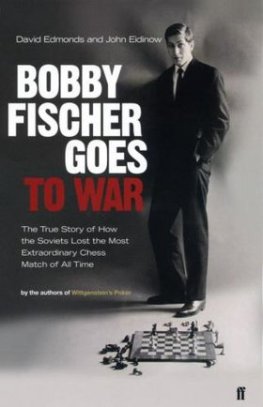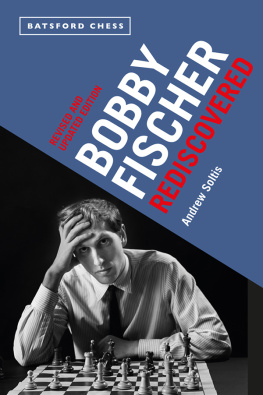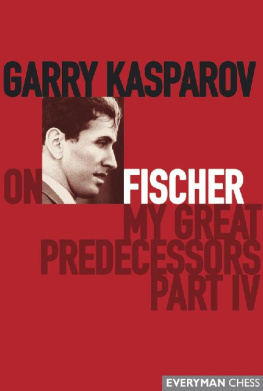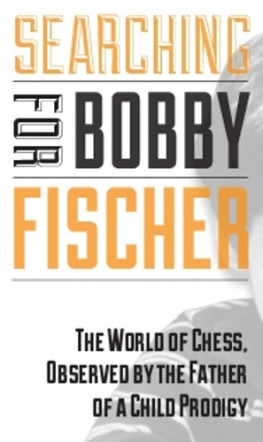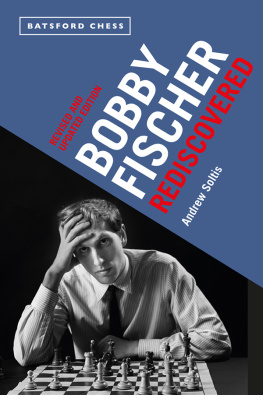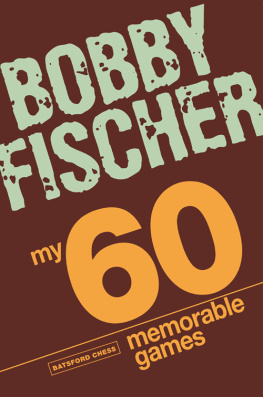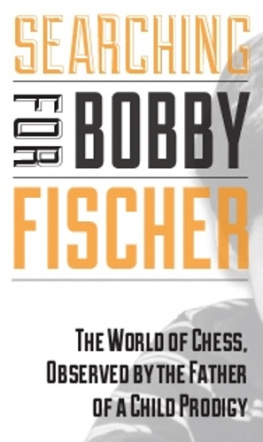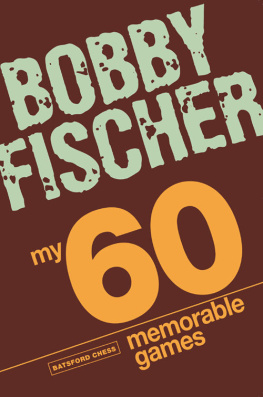Praise for
ENDGAME
Bobby Fischer began life as a lonely prodigy and ended it as a hate-spewing enigma, and in between became Americas greatest chess player, a man renowned both for his unmatched brilliance and social clumsiness. In Endgame, Frank Brady masterfully chronicles the full breadth of Fischers life, producing a narrative driven by staggering detail and profound insight into the psyche of a troubled genius.
Wayne Coffey, New York Times bestselling author of The Boys of Winter
The teenage prodigy, the eccentric champion, the irascible anti-Semite, the genius, the pathetic paranoidthese and other Bobby Fischers strut and fret their hour upon celebritys stage. Informed, thorough, sympathetic, and surpassingly sad.
Kirkus Reviews
A definitive and finely detailed chronicle of one of the most fascinating and eccentric Americans of the twentieth century, written by one of the few men with the expertise, knowledge, and writing ability to pull it off in a manner deserving of the subject.
Michael Weinreb, author of The Kings of New York
I have been following Bobby Fischer my whole life, but I learned something new on nearly every page of this wonderful book. Frank Brady is the perfect biographer for Bobby Fischer, and Endgame tells the full and fair story of Fischers astonishing rise and heartbreaking fall.
Christopher Chabris, coauthor of The Invisible Gorilla
Fischer is Americas greatest antihero. This fascinating biography is filled with hope, Cold War intrigue, the fulfillment of genius, and an explosive fall from grace that is both deeply moving and, ultimately, profoundly sad.
Jeremy Silman, author of The Amateurs Mind

To Maxine,
always my talisman
AUTHORS NOTE

AS SOMEONE WHO knew Bobby Fischer from the time he was quite young, Ive been asked hundreds of times, What was Bobby Fischer really like? This book is an attempt to answer that question. But a warning to those who turn these pages: Paradoxes abound. Bobby was secretive, yet candid; generous, yet parsimonious; naive, yet well informed; cruel, yet kind; religious, yet heretical. His games were filled with charm and beauty and significance. His outrageous pronouncements were filled with cruelty and prejudice and hate. And though for a period of decades he poured most of his energy and passion into a quest for chess excellence, he was not the idiot savant often portrayed by the press.
As Virginia Woolf observed in her one attempt at writing a life story, that of artist Roger Fry: A biography is considered complete if it merely accounts for six or seven selves, whereas a person may well have as many as one thousand. Many lives, and then second and even third acts, constitute the drama of Bobby Fischer, but my attempt here was to delineate just one of Fischers kaleidoscopic personalitiesthat of a genius, an inwardly tortured warriorand within that framework to capture his shifting identities and roles. The renowned psychologist Alfred Binet noted that if we could look inside the mind of a chess player we would see there a whole world of feelings, images, ideas, emotions and passions. And so it was with Bobby: His head was not merely filled with chess bytes, phantom computer connections on a grid of sixty-four squares, but with poetry and song and lyricism.
I ask forgiveness for my occasional speculations in this book, but Fischers motivations beg to be understood; and when conjecture is used, I inform the reader of my doing so. To vivify Bobbys extraordinary life I sometimes use the techniques of the novelist: elaboration of setting, magnification of detail, fragments of dialogue, and revelation of interior states. But always my use of those devices is based on my research, recollection, and study of the man. I want readerswhether they play chess or notto feel as though theyre sitting next to Bobby, on his side of the chessboard, or in the privacy of his home, experiencing the rush of his triumphs, the pain of his defeats, and the venom of his anger.
Ive been following Bobby Fischers life story from the first time we metat a chess tournament when he was a child and I was a teenall the way to his grave in the remote and windswept countryside of Iceland. Over the years we played hundreds of games together, dined in Greenwich Village restaurants, traveled to tournaments, attended dinner parties, and walked the streets of Manhattan for hours on end. He was light-years ahead of me in chess ability, but despite the yawning gap that separated us, we found ways to bond. I knew his family and had many talks about Bobby with his mother.
Though Bobby and I were friends, with a tempestuous relationship that remained on for years and eventually was off, I was also a privileged official witness to his greatness. As a director of one of the first rated tournaments he played in as a child, I noted his steadfastness. As an arbiter when he accomplished his historic 110 clean sweep at the 196364 U.S. Championship tournament, I stood by his board and observed his pride of accomplishment. And as the initial arbiter for Bobby when he was banned from traveling to Cuba for the Havana International Tournament and forced to play remotely by Teletype entry, I spent hours alone with him in a closed room of the Marshall Chess Club, watching how his deep concentration was being compromised by fatigue.
Although Endgame includes many incidents to which I was an eyewitness or in which I participated, the book is not in any way my memoir, and Ive tried to remain invisible as much as possible. Through original research, analysis of documents and letters heretofore untapped, and hundreds of interviews over the years with people who knew or had a different perspective on Bobby, Ive tried to capture the story of how he not only transformed himself, but also how, through a mysterious alchemy, he affected the image and status of chess in the minds of millions. And also how, unexpectedly, he saw his life become intertwined with the Cold War.
Mainly as a result of Bobbys charisma and his widely publicized contretemps, his winning the World Championship created more furor and attentionand more awareness of the game by the general publicthan any other chess event in history. Bobby had an uneasy relationship with his extraordinary celebrity and ultimately grew to despise it. It was the publics intrusive gaze that caused him, in later years, to lead a determinedly reclusive, almost hermetic life.
For this book, I obtained access to portions of the KGB and FBI files on Bobby and his mother; the files not only provided me with insights but also with specific information that corrects previously published versions of Bobbys life (including my own).
In the course of researching Endgame, I came across an autobiographical essaynever publishedthat Bobby wrote when he was in his teens, rough-hewn for sure, but introspective nevertheless, which in many ways gave the story behind the story of his life at that time, especially how he viewed his ascent and how he was treated by various chess organizations. Information that I found in this essay helped to rectify existing misconceptions. In addition, I obtained access to the personal archives of his chess mentor, Jack Collins, and of Bobbys mother, Regina Fischer. These invaluable troves of letters, photos, and clippings have been an important source for this book. Reading a letter from Bobby to Jack Collins, written decades ago, is almost like bringing Bobby back to life.
Next page

